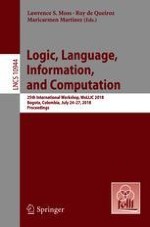2018 | OriginalPaper | Chapter
The Effort of Reasoning: Modelling the Inference Steps of Boundedly Rational Agents
Authors : Sonja Smets, Anthia Solaki
Published in: Logic, Language, Information, and Computation
Publisher: Springer Berlin Heidelberg
Activate our intelligent search to find suitable subject content or patents.
Select sections of text to find matching patents with Artificial Intelligence. powered by
Select sections of text to find additional relevant content using AI-assisted search. powered by
